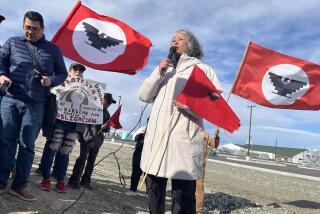AFL-CIO to Fight Renewal of China Trade Benefits : Labor: Lane Kirkland says union will back revocation of Beijing’s most-favored-nation status. Statement complicates Administration’s dilemma.
- Share via
WASHINGTON — In a serious new complication for the Clinton Administration’s China policy, AFL-CIO President Lane Kirkland indicated Wednesday that organized labor will strongly oppose renewal of the Beijing regime’s preferred trade benefits when they expire this summer.
The Administration needs the support of organized labor to win enactment of its health care plan and other elements of its domestic agenda. As a result, the White House may be reluctant to run afoul of the AFL-CIO on China policy, as it did last year when President Clinton lobbied hard for support of the North American Free Trade Agreement.
“We are losing jobs to China,” Kirkland said at a news conference. The $20-billion-a-year U.S. deficit in trade with China “is a measure of the dimensions of that,” he said. “But jobs is not the touchstone issue in itself. The issue with us is how our brothers and sisters in China who work for a living are treated.”
The statement by organized labor was the second development in the last two weeks that appears to make it more difficult for China to win an unconditional extension of its most-favored-nation trade benefits.
Last week, Chinese authorities rounded up some prominent dissidents, thus undercutting arguments that the human rights climate inside China is improving.
Over the last two weeks, the Administration has been quietly studying four or five options on trade benefits for China next year. They range from wholesale renewal or revocation of the trade privileges to a possible intermediate step, in which the benefits would be preserved for private enterprises but ended for products of Chinese state enterprises.
Any country with most-favored-nation trade status is entitled to export its goods into the United States under the same low tariff rates as other countries with MFN status. China, which has had these benefits since 1980, now exports more than $30 billion a year in goods to the United States.
The Beijing government has said that if China loses the benefits, it will retaliate against American companies that sell to China or do business there. As a result, many U.S. firms have warned that cutting off China’s trade privileges could, in the end, lead to a loss of jobs for American workers.
On Wednesday, Kirkland--whose influence in Washington was demonstrated when he was seated next to First Lady Hillary Rodham Clinton at the President’s State of the Union address--angrily denounced the American business community for making these claims about China.
“I do not believe that American corporations give a tinker’s damn about jobs in the United States, and any representations they make about their deep and dying concerns over American jobs ought to be taken with a ton of salt,” he said.
“It’s quite clear that the soft underbelly of freedom, American corporate enterprise, is doing its level best to serve the interests of the dictators and the totalitarian regime in China. . . . There are lobbyists lobbying hard on China’s behalf for the sake of their own narrow pocketbook interests and for the right to continue to abuse and exploit labor.”
Since China’s 1989 crackdown on pro-democracy demonstrators at Tian An Men Square, the AFL-CIO has been increasingly active in China policy. Organized labor opposed the George Bush Administration’s efforts to reconcile with Beijing, and it has helped support those dissidents trying to organize Chinese workers.
On Wednesday, Kirkland made it plain that labor’s opposition to MFN renewal for China this year will go beyond its past efforts. “We intend to participate aggressively in that debate” over China’s trade benefits, he said. He maintained that China “has not met the most minimum conditions for satisfying the requirements of the granting of MFN treatment to their country.”
Last year, Clinton imposed a series of specific human rights conditions that China must satisfy before Secretary of State Warren Christopher will recommend renewal of MFN status. These conditions cover issues such as the use of forced labor in Chinese prisons, jamming of Voice of America radio broadcasts, release of political prisoners and China’s treatment of Tibet.
Clinton must decide by June 3 whether to renew China’s trade benefits for another year. At the same time, he must decide what the rules should be for any further extensions of MFN status next year.
More to Read
Inside the business of entertainment
The Wide Shot brings you news, analysis and insights on everything from streaming wars to production — and what it all means for the future.
You may occasionally receive promotional content from the Los Angeles Times.










